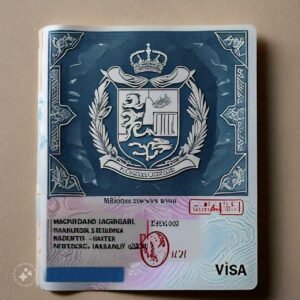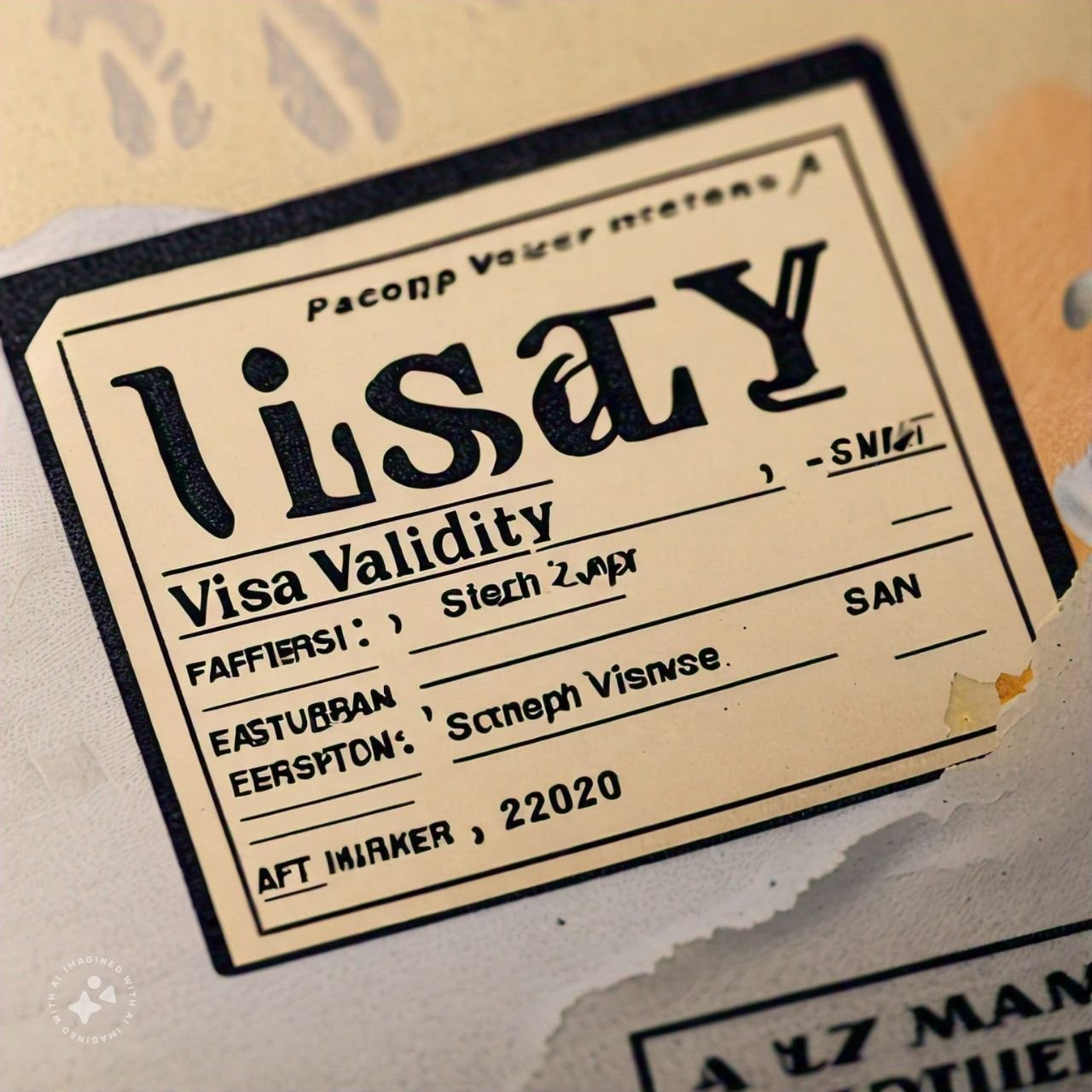Introduction
Understanding visa validity is essential for international travel. Visa validity defines the period during which you can use your visa. It determines your entry and exit windows from a foreign country. Knowing the validity period helps you plan your travel effectively.
Visa validity includes specific start and end dates. It also outlines the conditions of your stay. Misunderstanding these dates can lead to overstays or legal issues. Overstaying a visa can result in fines, deportation, or future travel bans.
Different visas have varying validity periods. Single-entry visas allow only one entry, while multiple-entry visas offer several entries. Transit visas are valid for brief periods, usually 24 to 72 hours.
The visa’s purpose and the issuing country influence its validity. Tourist visas often have shorter validity compared to business or student visas. Countries issue visas with different durations based on their regulations.
Regularly checking your visa’s validity ensures compliance. Knowing the exact dates helps prevent any issues with immigration authorities. Proper management of visa validity contributes to a hassle-free travel experience.
read more: Navigating Full-Time Jobs
Understanding Visa Validity
Visa validity is a crucial element of international travel. It defines the time frame in which your visa remains active. This period includes the start date and the end date. During this time, you can enter and stay in the country.
Visa validity determines when you can enter the country. For instance, if a visa is valid from January 1 to December 31, you must enter within this range. Once the visa expires, you must leave the country or face legal consequences.
The visa validity also impacts your length of stay. Some visas allow a stay for a specific number of days or months. For example, a tourist visa might permit a stay of up to 90 days within a six-month period.
Understanding these dates helps you avoid overstays. Overstaying a visa can result in fines or deportation. It might also affect your ability to obtain future visas.
Always check the visa’s validity before making travel plans. Ensure you enter and exit the country within the visa’s active period. Properly managing visa validity contributes to smooth and trouble-free international travel.

Types of Visa Validity Periods
Visa validity periods vary based on the type of visa. Understanding these types helps in planning your travel effectively.
Single-Entry Visas allow travelers to enter a country once during the visa’s validity. Once you leave the country, you cannot return with the same visa. These visas are ideal for short-term visits, such as tourism or business trips. They often have a fixed validity period, such as 30, 60, or 90 days.
Multiple-Entry Visas permit travelers to enter and exit the country several times within the visa’s validity period. This type of visa suits frequent travelers who need to visit the country multiple times. Multiple-entry visas are often used for business trips, long-term studies, or ongoing personal visits. They provide flexibility and convenience but may have a higher application fee.
Transit Visas are issued for short stays while passing through a country en route to another destination. They typically allow a stay of 24 to 72 hours. Transit visas are useful for travelers with layovers or stopovers. They are not for extended stays or frequent visits but rather for brief, necessary stops.
Understanding these visa types ensures you choose the right one for your travel needs.
Factors Affecting Visa Validity
Several factors influence the validity period of a visa. Understanding these factors helps in selecting the appropriate visa for your needs.
Purpose of Visit plays a significant role in determining visa validity. Tourist visas usually have shorter validity than business or student visas. If you are visiting for tourism, the visa may only be valid for a few months. In contrast, a business visa might be valid for several years, depending on your needs.
Country of Issue affects visa validity as well. Different countries have varying visa regulations and policies. Some countries issue long-term visas, while others provide short-term options. For instance, a U.S. visa might have different validity rules compared to a visa issued by a Schengen country.
Duration of Stay impacts the visa’s validity period. The length of time you plan to stay in the country determines the type of visa you need. Short visits might only require a few weeks or months, while long-term stays need a visa with extended validity. Ensure your visa covers your entire planned stay to avoid overstays.
Understanding these factors helps you apply for a visa that matches your travel plans.
read more: Exploring the World of Work
Checking Visa Validity
Checking your visa validity is crucial for a smooth travel experience. Start by reviewing your visa document carefully. Look for the start and end dates listed on the visa. Ensure you understand the duration of stay allowed.
Regularly check your visa’s validity status to avoid issues. This involves confirming that your visa has not expired. Overstaying a visa can lead to fines, deportation, or future travel restrictions. Make a habit of checking your visa status well before your travel dates.
Verify the visa’s conditions and entry requirements. Some visas have restrictions on the number of entries or specific conditions for stay. Ensure you meet these requirements to avoid complications at the border.
If you have a multiple-entry visa, track each entry and exit. Keep records of your travel dates to stay within the allowed period. For visas with fixed stay durations, plan your travel dates accordingly.
Before traveling, check with the issuing authority or embassy if you have any doubts. They can provide updated information on your visa validity. Properly managing your visa validity ensures a hassle-free travel experience.
Consequences of Expired Visas
Having an expired visa can lead to serious consequences. First, overstaying your visa can result in legal penalties. This often includes fines or monetary charges imposed by immigration authorities.
Second, you may face deportation from the country. Authorities can forcibly remove individuals who remain beyond their visa’s validity period. This process can disrupt your travel plans and affect future travel.
Third, overstaying can impact your future visa applications. Immigration officials may view you as a high-risk traveler. This perception can lead to visa denials or delays in future applications.
Additionally, having an expired visa might result in a ban on re-entry. Some countries impose re-entry bans for individuals who overstay their visas. This ban can last for several years and complicate future travel.
Finally, expired visas can affect your legal status in the host country. You may be considered an illegal resident, which can lead to further legal issues.
To avoid these consequences, always monitor your visa’s expiry date. Plan your departure or visa renewal well in advance. Proper management ensures compliance with immigration laws and a smooth travel experience.

Extending Visa Validity
Extending your visa validity allows you to stay longer in a country. Start by checking the specific extension procedures for your visa type. Each country has its own rules and requirements for visa extensions.
First, gather all necessary documents for the extension application. This typically includes your current visa, passport, and any supporting documents required by the immigration authorities. Ensure that all documents are up-to-date and accurate.
Next, submit your extension application before your current visa expires. Applying early helps avoid any legal issues or overstays. Immigration authorities often require applications to be submitted well in advance of the visa’s expiry date.
In some cases, you may need to provide proof of your reason for extending your stay. This could include documentation related to your job, studies, or other commitments in the country. Clearly state your reason and provide any requested evidence.
Finally, pay any applicable fees for the extension process. Fees vary depending on the country and visa type. After submitting your application and fees, await approval from the immigration authorities. Properly managing your visa extension ensures continued compliance with immigration laws.
Conclusion
Understanding visa validity is essential for smooth international travel. It helps you manage your stay and avoid legal issues. Knowing the types of visas and their validity periods ensures you choose the right one for your needs.
Different visas, such as single-entry, multiple-entry, and transit visas, come with varying validity periods. Each type serves a specific purpose and offers different advantages. Being aware of these types helps in planning your travel effectively.
Several factors affect visa validity, including the purpose of your visit, the country of issue, and the duration of your stay. Recognizing these factors helps you apply for the appropriate visa and avoid overstaying.
Regularly checking your visa validity ensures you stay within legal limits. Overstaying can result in fines, deportation, or future travel restrictions. Proper management of your visa status prevents complications and legal issues.
If you need to extend your visa, follow the correct procedures and apply early. Gathering the necessary documents and paying any fees on time helps in securing an extension.
Frequently Asked Questions (FAQs)
1. What is visa validity?
Visa validity refers to the period during which a visa is active. It includes the start and end dates when you can use the visa to enter and stay in a country.
2. How can I check my visa’s validity?
Check your visa document for the start and end dates. Regularly verify these dates and ensure your stay complies with the visa’s terms.
3. What happens if my visa expires?
If your visa expires, you may face fines, deportation, or future travel restrictions. It is crucial to leave the country or renew your visa before it expires.
4. Can I extend my visa?
Yes, you can extend your visa by applying for an extension with the immigration authorities. Submit your application and required documents before your current visa expires.
5. What are the types of visa validity periods?
The main types are single-entry, multiple-entry, and transit visas. Single-entry allows one entry, multiple-entry allows several entries, and transit visas are valid for short stays during travel.
6. What factors affect visa validity?
Visa validity is influenced by the purpose of your visit, the country of issue, and the duration of your stay. Each factor impacts the type and length of the visa granted.
7. How can I avoid overstaying my visa?
Monitor your visa’s expiry date, plan your departure accordingly, and apply for extensions if needed. Staying within the validity period avoids legal complications and fines.
8. Where can I get more information about visa validity?
For detailed information, contact the embassy or consulate of the country issuing your visa. They can provide specific guidance based on your visa type and situation.
y understanding and managing your visa validity, you ensure a hassle-free and enjoyable travel experience.
